Introduction
Rabbits are adorable, curious creatures with specific dietary needs to keep them healthy and happy. If you’re a rabbit owner or enthusiast, you might find yourself wondering, “Can rabbits eat beets?” This vibrant root vegetable is common in various cuisines and has found its way into many human diets.
However, when it comes to feeding beets to rabbits, there are essential considerations to keep in mind.
This guide will walk you through everything you need to know about feeding beets to your furry friend, from the benefits and risks to how much and which parts are safe to consume.
Can Rabbits Eat Beets?
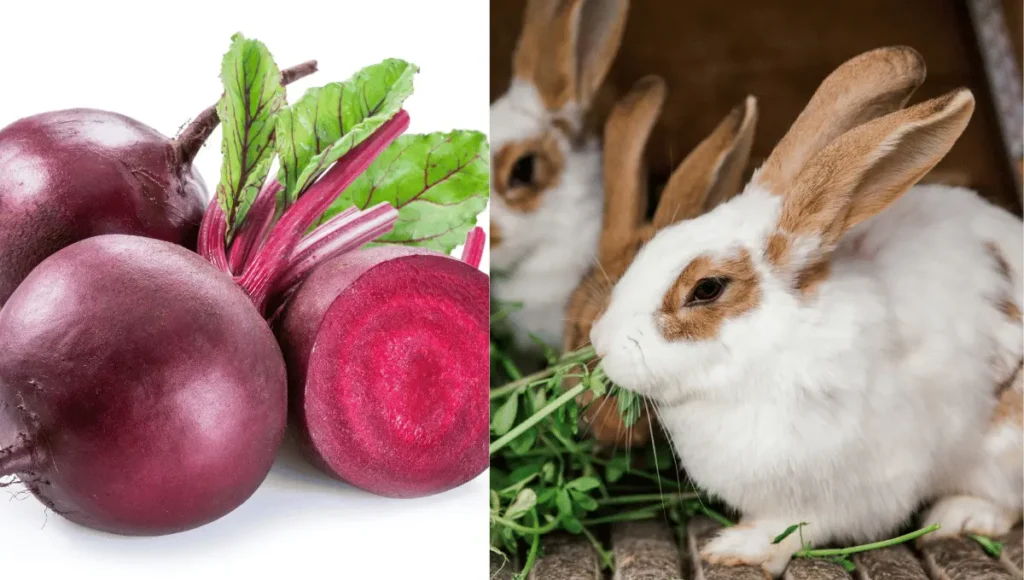
Rabbits can indeed eat beets, but with caution and in moderation. Beets are rich in essential nutrients like fiber, folate, and vitamin C, which can benefit your rabbit when offered appropriately.
However, it’s important to remember that beets are high in sugar compared to the leafy greens typically recommended for rabbits.
The beet plant consists of both the root and the leafy stalks, and not all parts are equally suitable for your pet.
While the beetroot itself is safe for rabbits, it should be offered sparingly due to its high sugar content. Excessive consumption of sugary foods can lead to obesity, digestive issues, and other health problems in rabbits.
On the other hand, beet greens are a better option, as they are lower in sugar and rich in nutrients that contribute to a rabbit’s overall health.
It’s crucial to introduce beets gradually into your rabbit’s diet, starting with small amounts to see how they react.
Always monitor your rabbit for any signs of digestive distress or allergic reactions after introducing a new food. If your rabbit shows any adverse effects, discontinue feeding beets and consult a veterinarian.
Nutrition in beets for rabbits
| Nutrient | Beetroot (per 100g) | Beet Greens (per 100g) | Benefits for Rabbits |
| Calories | 43 kcal | 22 kcal | Provides energy, but be cautious with quantity due to the higher calorie content in beetroot. |
| Carbohydrates | 9.6 g | 4.3 g | Source of energy, but the sugar in beetroot can be high. Beet greens are lower in carbs. |
| Sugar | 6.8 g | 0.5 g | High in beetroot; excessive sugar can lead to obesity and dental issues in rabbits. |
| Fiber | 2.8 g | 3.7 g | Essential for digestive health; beet greens are a better source of fiber. |
| Protein | 1.6 g | 2.2 g | Supports muscle maintenance; beet greens offer more protein. |
| Fat | 0.2 g | 0.2 g | Minimal fat content, making both beetroot and beet greens low in fat. |
| Vitamin A | 0% DV | 89% DV | Important for vision and immune function; beet greens are an excellent source. |
| Vitamin C | 8% DV | 25% DV | Supports the immune system; beet greens have a higher content of vitamin C. |
| Vitamin K | 0.2% DV | 500% DV | Crucial for blood clotting and bone health; beet greens are extremely rich in Vitamin K. |
| Folate | 20% DV | 30% DV | Supports cell growth and function; both beetroot and beet greens are good sources. |
| Calcium | 16 mg | 119 mg | Essential for bone health; beet greens offer a much higher amount of calcium. |
| Iron | 0.8 mg | 2.6 mg | Important for blood health; beet greens provide more iron. |
| Potassium | 325 mg | 762 mg | Supports heart function and fluid balance; beet greens are richer in potassium. |
DV = Daily Value
Note: While beets provide various nutrients beneficial for rabbits, they should still be fed in moderation due to the high sugar content in beetroot. Beet greens, with their richer nutritional profile and lower sugar content, are generally a better option for more frequent feeding.
Benefits of Beets for Rabbits
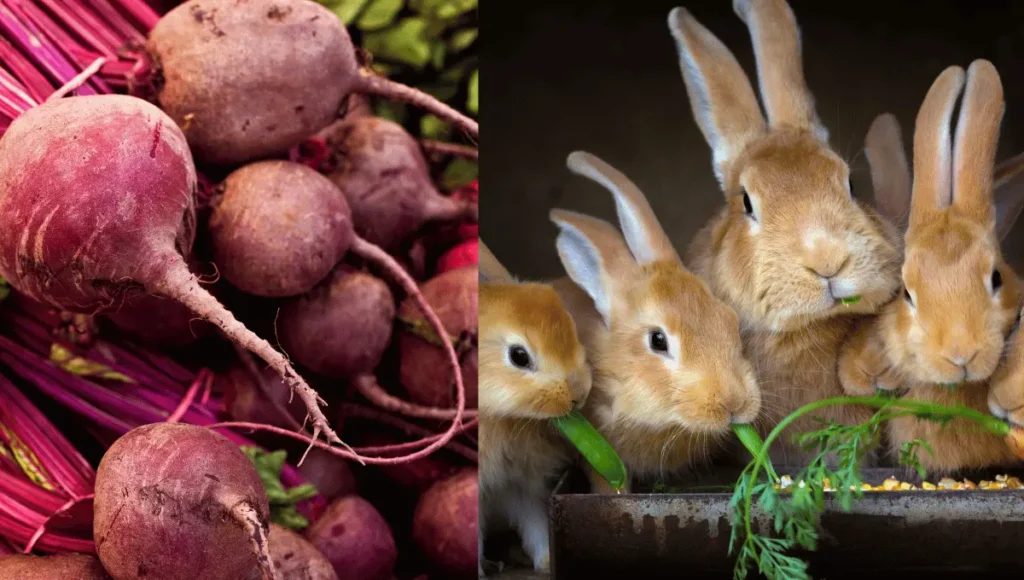
Beets offer several nutritional benefits for rabbits when included in their diet in moderation. The root and the leaves of the beet plant are rich in essential vitamins and minerals that can contribute positively to a rabbit’s health.
- High in Fiber: Beets contain a good amount of dietary fiber, which is crucial for maintaining a rabbit’s digestive health. A diet high in fiber helps prevent common issues such as gastrointestinal stasis, a potentially life-threatening condition in rabbits.
- Rich in Antioxidants: Beets are a rich source of antioxidants, particularly betalains, which help reduce inflammation and support overall cellular health. These antioxidants can be beneficial in preventing oxidative stress in rabbits.
- Vitamins and Minerals: Beetroot and beet greens are packed with essential vitamins and minerals like vitamin C, potassium, and manganese. These nutrients are vital for maintaining a healthy immune system, strong bones, and proper muscle function in rabbits.
- Hydration: Beets have a high water content, which can help keep your rabbit hydrated. This is especially important during hot weather when rabbits are more prone to dehydration.
However, it’s important to balance these benefits with the potential risks associated with the high sugar content in beets.
Therefore, while beets can be a healthy addition to your rabbit’s diet, they should only be given in small quantities and as an occasional treat.
How Many Beets Can Rabbits Eat?
When feeding beets to rabbits, portion control is key. Due to their high sugar content, beets should not form a significant part of a rabbit’s diet.
Instead, they should be treated as an occasional supplement to the primary diet of hay, leafy greens, and a limited amount of pellets.
Guidelines for Feeding Beets:
Root Portion: Limit beetroot to about 1-2 teaspoons per serving, given no more than twice a week. This small amount is enough to provide some nutritional benefits without overwhelming your rabbit’s system with sugar.
Leafy Greens: Beet greens can be fed in slightly larger amounts, but still, no more than a handful a few times a week. They are lower in sugar but still rich in nutrients, making them a healthier option for frequent feeding.
Frequency:
Beets should be offered only occasionally, as part of a varied diet that includes plenty of fiber-rich hay and fresh water.
Always observe your rabbit after introducing beets into their diet. If you notice any changes in their stool consistency or behavior, reduce the quantity or frequency, or eliminate beets from their diet altogether.
Do Rabbits Like Beets?
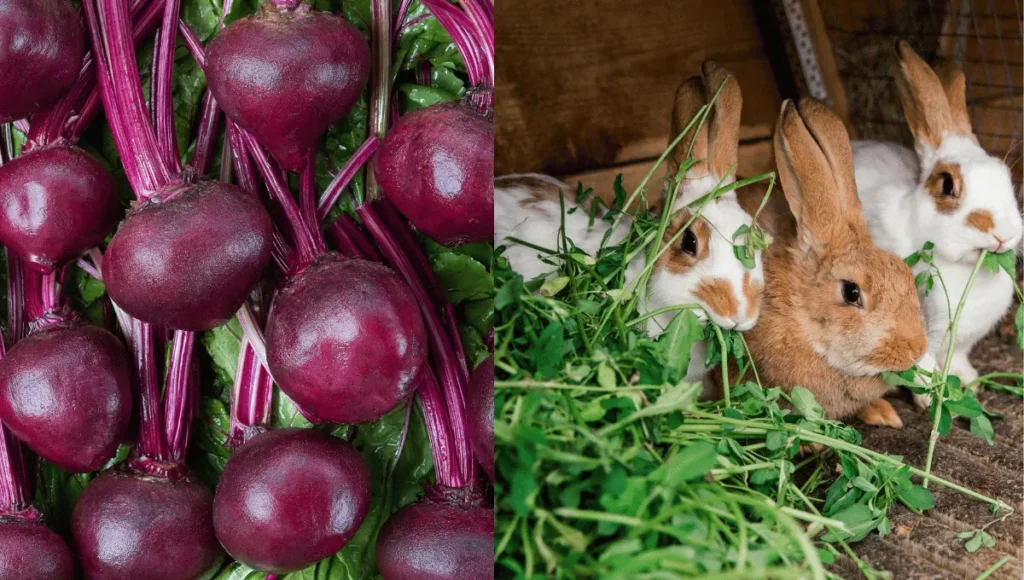
Rabbits, like humans, have individual taste preferences, and some rabbits may enjoy the taste of beets, while others may not.
Beetroot’s sweet taste can appeal to many rabbits, making it an attractive treat option. However, just because your rabbit likes beets doesn’t mean they should be fed in large quantities.
Signs Your Rabbit Likes Beets:
- Excitement when presented with beets
- Eagerly eating the beetroot or beet greens
- Finishing the portion offered within a short time
Signs Your Rabbit Dislikes Beets:
- Ignoring the beets or pushing them away
- Taking a nibble and then leaving the rest untouched
- Displaying signs of digestive discomfort after eating
If your rabbit doesn’t seem to enjoy beets, it’s best not to force them to eat them. Instead, try offering other safe vegetables and greens that might be more to their liking.
Can Baby Rabbits Eat Beets?
Baby rabbits, also known as kits, have delicate digestive systems that are not yet fully developed. For the first few weeks of their lives, baby rabbits should primarily be nursing from their mother and gradually transition to solid foods like hay and pellets as they grow older.
Risks of Feeding Beets to Baby Rabbits:
Digestive Issues: Baby rabbits are more prone to digestive disturbances, and introducing sugary or complex foods like beets too early can cause serious gastrointestinal problems, including diarrhea, which can be fatal in young rabbits.
Nutritional Imbalance: During their early development, baby rabbits need a diet rich in fiber and essential nutrients to support their growth. Beets, while nutritious, do not provide the balanced nutrition necessary for a growing rabbit.
When to Introduce Beets:
It’s generally recommended to wait until a rabbit is at least 12 weeks old before introducing any new vegetables, including beets, into their diet. Even then, it’s crucial to start with very small amounts and observe how they react.
Can Wild Rabbits Eat Beets?
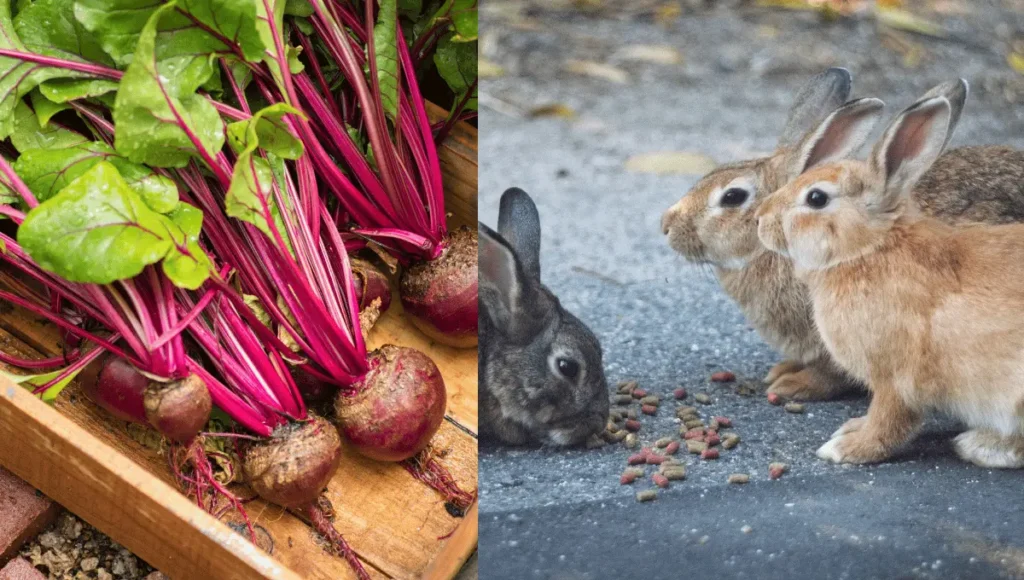
Wild rabbits have a diet that differs significantly from that of domestic rabbits. They primarily eat grasses, leaves, and other vegetation that is readily available in their natural habitat.
While it’s possible for wild rabbits to eat beets if they come across them, it’s not a common or natural part of their diet.
Differences in Diet:
Natural Diet: Wild rabbits tend to eat what is most abundant in their environment, which usually includes grasses, leaves, and twigs rather than root vegetables like beets.
Digestive Adaptation: Wild rabbits have digestive systems adapted to a diet high in fibrous plant material and low in sugar. Introducing beets or other non-native foods can disrupt their digestion.
Should You Feed Beets to Wild Rabbits?
It’s generally not recommended to feed wild rabbits, as they are adapted to survive on their natural diet.
However, if you do choose to offer food to wild rabbits, it’s best to stick to foods that are closer to their natural diet, such as leafy greens or hay, rather than sugary root vegetables like beets.
Can Rabbits Eat Beet Leaves?
Beet leaves, also known as beet greens, are a safer and healthier option for rabbits compared to beetroot. They are lower in sugar and packed with nutrients, making them a beneficial addition to your rabbit’s diet when fed in moderation.
Nutritional Benefits of Beet Leaves:
- Low Sugar Content: Beet greens have significantly less sugar than the beetroot, reducing the risk of weight gain and other health issues associated with high sugar intake.
- Rich in Vitamins: Beet greens are a good source of vitamins A, C, and K, which are essential for maintaining a rabbit’s immune system, vision, and bone health.
- High in Fiber: The fibrous nature of beet greens can aid in digestion and help prevent issues like gastrointestinal stasis, which is common in rabbits.
Feeding Guidelines:
- Beet greens can be fed more frequently than beetroot, but should still be offered in moderation. A small handful of beet greens once or twice a week is sufficient.
- Always wash the leaves thoroughly to remove any pesticides or chemicals before offering them to your rabbit.
Can Rabbits Eat Beet Pulp?
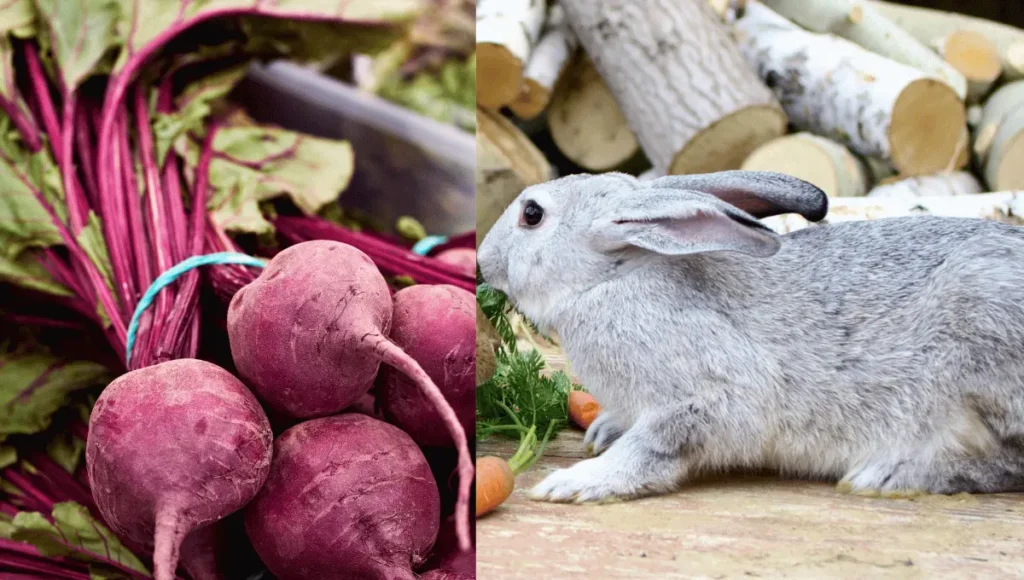
Beet pulp is the fibrous material left over after sugar is extracted from sugar beets. It’s commonly used in livestock feed because it is high in fiber and relatively low in sugar.
However, when it comes to feeding beet pulp to rabbits, caution is advised.
What is Beet Pulp?
Beet pulp is a byproduct of sugar beet processing, commonly used in animal feed due to its high fiber content. It can be fed to certain animals to help maintain digestive health.
Is Beet Pulp Safe for Rabbits?
While beet pulp is high in fiber, it is still processed and not a natural part of a rabbit’s diet. The processing methods might include additives or chemicals that are not suitable for rabbits.
If considering beet pulp for your rabbit, it should be pure and free from any added sugars, molasses, or preservatives. Even then, it should only be offered in very small amounts, if at all.
Feeding Recommendations:
Given the availability of natural, fresh options like hay and leafy greens, beet pulp is generally unnecessary for rabbits. It’s best to stick to whole foods that closely mimic what rabbits would eat in the wild.
Can Rabbits Eat Pickled Beets?
Pickled beets are a popular food item for humans but should be strictly avoided when it comes to feeding your rabbit.
The pickling process involves vinegar, salt, and sometimes sugar, all of which are harmful to rabbits.
Why Pickled Beets Are Dangerous:
- High in Sodium: The salt content in pickled beets can lead to dehydration and other health issues in rabbits, who require a low-sodium diet.
- Acidic Content: The vinegar used in pickling is highly acidic and can upset a rabbit’s sensitive digestive system, leading to stomach discomfort and potential long-term harm.
- Added Sugars: Some pickled beets contain added sugars, which can contribute to obesity, dental problems, and other health issues in rabbits.
Can Rabbits Eat Sugar Beets?
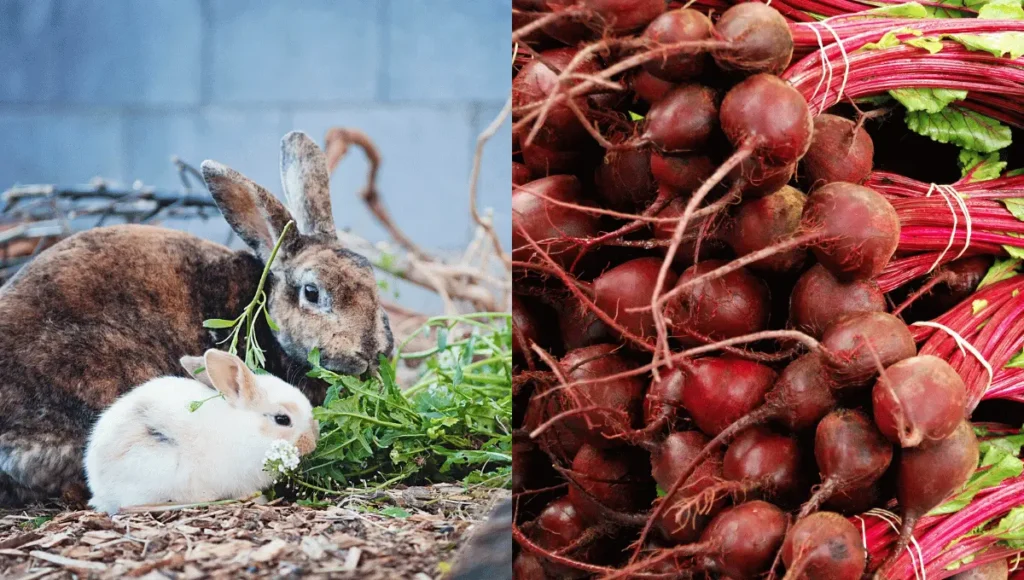
Sugar beets are a variety of beets specifically cultivated for their high sugar content. While they might seem like a tempting treat for your rabbit, they are not a safe choice due to their extremely high sugar levels.
Understanding Sugar Beets:
High Sugar Content: Sugar beets are processed to extract sugar, meaning they contain significantly more sugar than regular beets. This makes them a poor dietary choice for rabbits, who are prone to obesity and dental issues from excessive sugar intake.
Risks of Feeding Sugar Beets to Rabbits:
- Obesity: The high sugar content in sugar beets can lead to rapid weight gain, which is dangerous for rabbits. Obesity in rabbits can cause a range of health issues, including heart disease and joint problems.
- Digestive Problems: Excessive sugar can disrupt the balance of bacteria in a rabbit’s gut, leading to gastrointestinal issues such as diarrhea or bloating.
Beet Parts and Their Suitability for Rabbits
| Beet Part | Suitability for Rabbits | Frequency |
| Beetroot | Safe in moderation | 1-2 teaspoons, 1-2 times a week |
| Beet Leaves | Safe, lower in sugar | Handful, 2-3 times a week |
| Beet Pulp | Not recommended | N/A |
| Pickled Beets | Unsafe | Never |
| Sugar Beets | Unsafe | Never |
Conclusion
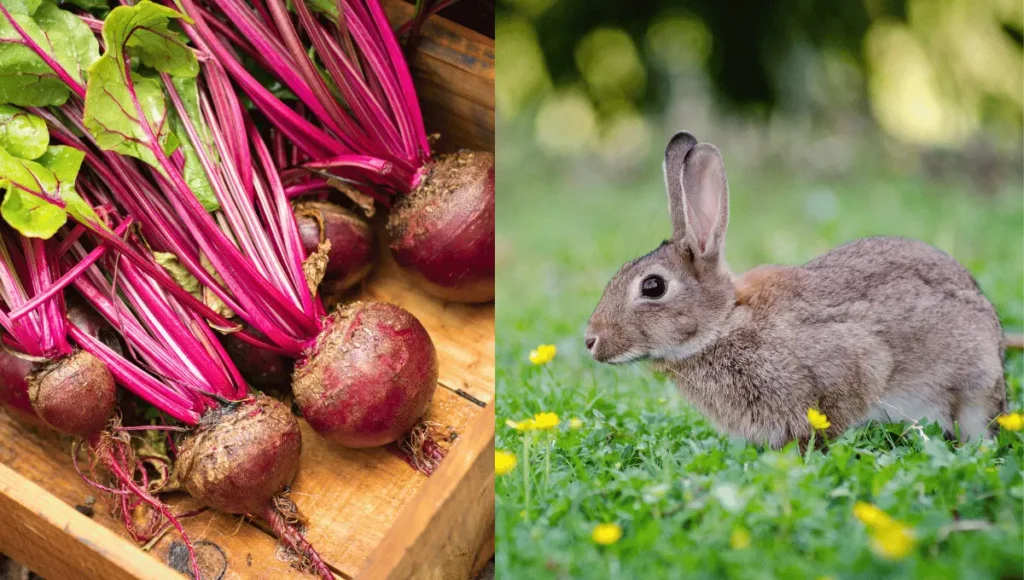
In conclusion, while rabbits can eat beets, it’s important to do so with caution and moderation. Beets, especially the root, are high in sugar and should only be offered as an occasional treat rather than a staple in your rabbit’s diet.
Beet greens are a healthier option, providing essential nutrients without the added sugar. Always monitor your rabbit’s reaction to new foods and consult a veterinarian if you’re unsure about introducing beets or any other food into their diet.
By following these guidelines, you can ensure your rabbit stays healthy and happy, while still enjoying the occasional tasty treat.
FAQs
Can rabbits eat beets every day?
No, rabbits should not eat beets every day. Due to their high sugar content, beets should only be given as an occasional treat, no more than 1-2 times a week.
Are beet leaves better for rabbits than beetroot?
Yes, beet leaves are generally better for rabbits because they are lower in sugar and rich in essential nutrients. However, they should still be fed in moderation.
What should I do if my rabbit eats too many beets?
If your rabbit eats too many beets, monitor them closely for any signs of digestive upset, such as diarrhea or bloating. If you notice any adverse symptoms, contact your veterinarian for advice.
Can baby rabbits eat beets?
No, it’s best to avoid feeding beets to baby rabbits. Their digestive systems are delicate, and introducing sugary or complex foods too early can cause serious health issues.
Is it safe to feed wild rabbits beets?
It’s not recommended to feed wild rabbits beets. Wild rabbits have different dietary needs, and beets are not a natural part of their diet. Stick to more natural food options like grasses and leafy greens if you choose to feed them.
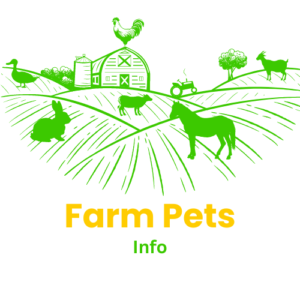
Pingback: Can Rabbits Eat Cucumbers? Benefits and Risks Explained - Farm Pets
Pingback: What Can Rabbits Eat? Safe and Healthy Food Options
Pingback: Can Rabbits Eat Watermelon? A Safe Feeding Guide - Farm Pets
Pingback: Can Rabbits Eat Kale? Benefits and Risks Explained